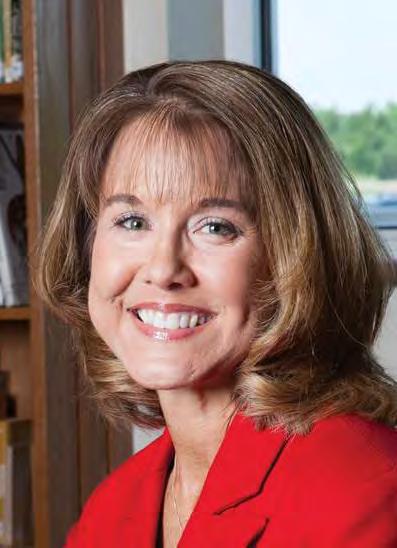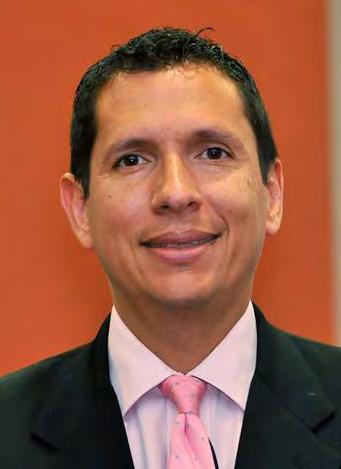
18 minute read
MEET TASA’S INSPIRING LEADERS
Meet TASA’s Meet TASA’s Inspiring Leaders Inspiring Leaders
Now more than ever, Texas public school staff members are looking to leaders to inspire them in their day-to-day work as we all cope with an ever-changing educational landscape. TASA’s “Inspiring Leaders” tagline is not just a reminder of TASA’s commitment to leadership development — it describes our members themselves. In this and future issues of INSIGHT, you’ll meet some of those Inspiring Leaders, and it’s our hope that they will guide you and invigorate you in the work that you do. To nominate a leader for inclusion, email drivers@texasschoolbusiness.com.
King Davis
Dr. King Davis was chosen to lead Sheldon ISD in January of 2016, bringing with him 27 years of experience in education as a teacher, coach, assistant principal, principal, assistant superintendent and superintendent. Since then, Davis has helped usher the district through devastation caused by Hurricane Harvey and now faces leading Sheldon through the COVID-19 pandemic. Through it all, Davis has kept a strong focus on success and is driven by the progress he’s seen in the district.
“I could not be more proud of this district and how far we have come,” Davis says. “Over the past five years, we have raised the expectations for our student achievement through enhanced programs in the classroom. Our teachers have spent extensive time in training to prepare them for differentiated instruction that offers our students personalized learning experiences. I’m proud of the progress we have made to address the diverse needs of our students.”
Tina Herrington, who like Davis formerly served as superintendent in Wharton ISD, says that Davis is a strong, dedicated leader who consistently works to forward student success.
“Dr. Davis is dedicated to putting systems together and growing administrators to grow successful students,” Herrington says. “He is focused on overcoming all barriers to put programs and initiatives in place. He is a true inspiring leader for other educators.”
Davis describes his personal philosophy as that of a certain major automobile manufacturer: “the relentless pursuit of perfection.” While he concedes that perfection is an elusive goal, it’s one that he still strives for daily. In his role as an educational leader, Davis feels that failure simply isn’t an option. Too much rides on his success. He cites a quote from Aristotle, which states: “The educated differ from the uneducated as much as the living from the dead.”
“When I initially heard this quote some years ago, I thought it was a bit extreme,” Davis says. “Upon further reflection, I’ve concluded that it wasn’t extreme at all, but states a powerful truth. A proper education is so critical to one’s life, that without it, one may very well experience a form of death. The death of dreams, goals, aspirations, prosperity and hope becomes a reality for many of our citizens who lack the opportunities that come along with a proper education. Public education is the only hope that many of our school-aged citizens have; therefore, we must pursue perfection daily.”
Deann Lee
Four years ago, Deann Lee was named superintendent of Millsap ISD. With more than 30 years of education experience, Lee has worked to foster many new programs in the district, including a teacher mentoring program, instructional technology and a strategic planning initiative. Above all, what makes her most proud of Millsap is the district’s reputation for being a community that values relationships and aims for ethical behavior and personal responsibility

“Our culture is defined by our mission, vision and values,” Lee says. “These aren’t words on a wall. They drive our goals, determine our hires, and lead our decisions.”
Gunter ISD Superintendent Jill Siler says that watching the way Lee leads has had a positive impact on her, and she’s quick to sing her peer’s praises.
“Deann Lee’s school district may be small, but her impact on leaders across our state is huge,” Siler says. “She is an encourager and a constant source of hope and optimism during challenging seasons.”
Lee’s encouragement helps nurture a family atmosphere in the district, and she credits her strong sense of purpose for keeping her on track in challenging times.
“The philosophy that keeps me going is that I am called to serve at this moment in time for a specific purpose,” Lee says. “When I am challenged or stressed, I remember that my decision will affect my students’ futures. This is a remarkable (and scary) privilege that fuels my passion to give every ounce of energy I have daily.”

That passion extends to participating in networking and mentorship opportunities, as Lee has seen first-hand the difference strong peer relationships can have in her own work and beyond.
“As leaders, it’s our responsibility to build systems that will continue to propel our districts far beyond our tenure,” she says. “It’s also our honor to perpetuate a culture of service by growing others through the knowledge we have gained from the experiences of our journey. The benefit of these relationships is that we collectively become stronger for the welfare of our world, and we have the joy of sharing life with kindred spirits.”
Patricia Lewis
For the past eight years, Patricia Lewis has served in the administration in Grand Prairie ISD, where she currently holds the role of associate superintendent. A teacher for 18 years before moving into administration, Lewis has known she wanted to be an educator since she was in the fourth grade. For her, teaching is all about leadership — leading others, but also empowering a new generation of leaders.
“As educators, we can directly impact the future of our world, for the better,” she says. “I decided long ago not to allow myself to give up, not to become discouraged. Instead, I have developed a laser focus on what I can do today to directly impact the future of this world. Are there challenges? Yes. Am I ever discouraged? Certainly. But, the truth of our role as educators, we must never lose sight of our truth.”
Cornelia McCowan, executive director of college readiness in Grand Prairie ISD, says that Lewis is an evolutionary leader who truly loves people.

“Mrs. Lewis has a serve-first mindset, and her focus is always on empowering and uplifting her team,” McCowan says. “She serves with humility and kindness and is always looking to enhance the development of her team. She is intentional and knows how to unlock potential, creativity and a sense of purpose in those around her.”
A self-proclaimed lifelong learner, Lewis feels that mentorship and relationship building are key in successful leadership. She cites her abilities to build positive relationships as a foundation for her success, both personally and professionally.
“I would not be the associate superintendent of schools were it not for all the people who have mentored me along the way,” she says. “We must encourage meaningful relationships with other educators, plan for it, prepare for it and equip each other with methods to mentor in meaningful ways.”
Danny Massey
Brazosport ISD Superintendent Danny Massey has worked in the district for 29 years, serving the last five in the leadership role. No stranger to accolades, Massey was named Region 4’s 2020 Superintendent of the Year and was also named Man of the Year by the Brazosport Area Chamber in 2019, yet it’s the success he’s seen in the district that makes him most proud.

“We have dramatically improved our student performance from a TEA accountability rating of a 74 to an 88. All three of our high schools have also earned an A rating in college-, career- and military-readiness. This is especially important as our mission is to graduate each student to be ‘future-ready,’” Massey says. “This shows that we are living our mission, and it’s not just a catchy phrase. We have also recently passed two bond referendums, and are transforming our facilities and campuses.”
During COVID-19, Massey has sent staff weekly inspiring emails, full of much-needed words of encouragement. Last spring, he created videos recognizing seniors for their involvement in the district’s athletics and fine arts programs. He even donned a tuxedo and traveled to the homes of winners of the BISD Foundation’s annual Grants for Great Ideas to present award checks in person.

Ron Redden, assistant superintendent of compliance and data quality in Brazosport, says Massey is an inspiring leader due to the way he brings out the best in those around him.
“For the last five years, he has been the inspirational leader of a remarkable turnaround of the district,” Redden says.
To Massey, leadership is all about helping others. And he believes that the best leaders are those who dedicate themselves to growing new leaders.
“We all can attribute our leadership experiences to opportunities others provided for us,” he says. “It’s important we pay it back and invest in others.”
Brian Cole, Brazosport’s assistant superintendent of curriculum and instruction, says Massey is known throughout the district and beyond for his transparency, visibility and positivity.
“Danny Massey continues to inspire me by maintaining a relentless focus on celebrating the great things that are going on in our district and in public education,” Cole says.
Through all of the hard work, the mentorship and the challenges, Massey stays focused by reminding himself of the many things that make him thankful, and those he feels drawn to serve.
“I believe that every day is a gift and it should be lived with the gratitude it deserves,” he says. “We must stay focused on what we believe benefits our students, which is building quality relationships, literacy, and college or career readiness.”
Robert Sormani
Hutto ISD welcomed Dr. Robert Sormani to the associate superintendent of instruction and innovation position in 2017. A veteran educator with more than 20 years of experience, Sormani says he is exceptionally proud of the district, but never more so than in recent challenging times.

“I am most proud of the sense of unity in Hippo Nation. It has never been tested more than now during the pandemic and these turbulent political times,” Sormani says. “Our staff and community remain focused on what is best for our students by maintaining open and honest lines of communication allowing us to discuss tough topics and move forward.”
Dr. Lindsie Almquist, who serves as director of human capital in Hutto, says Sormani leads with a “students-first” focus that includes data-driven decisions, feedback loops and open communication.
“Dr. Sormani has allowed for innovation through providing resources, but allowing for autonomy, grace, innovation and leveraging of leadership to exist in order for positive change to occur,” Almquist says. “He doesn’t allow people to be held back when they are meant to fly. He provides a structure, and then encourages unique differences to flourish within the parameters of success.”
In times of challenge, Sormani says he keeps his focus on what matters most — student outcomes. He measures each day by how his actions have opened doors and provided opportunities for students in Hutto.

“No matter what criticisms or challenges I face, if I know I have positively impacted students’ lives, or sometimes a single child’s life, I can let it all go when I leave for home and do it all again the next day.”
Sormani says mentorship has been crucial in his career, especially in the early days of his work in schools, as he developed his educational philosophy and leadership values. Now, those continuing relationships help keep him grounded and connected to his work.
“As you become more experienced, good mentors and colleagues keep you honest,” he says. “They ask you if you are staying true to your own mantras. And just as importantly, they become lifelong friends that can help you laugh through the tough times and celebrate during the good times.”
In an era where
racial tensions
dominate discourse
across the U.S.,
developing educational leaders’
capacities to challenge perceptions of diversity and equity are vital.
Study abroad experiences: challenging aspiring leaders’ perceptions of diversity
By Yanira Oliveras-Ortiz, Ph.D., The University of Texas at Tyler
One of the responsibilities of educational leaders is to develop teachers’ capacities to meet the needs of every child in their classroom. Hence, principal preparation programs must develop aspiring leaders with the capacity to lead increasingly diverse schools. The demographics of Texas schools illustrate there is not just a perception of disparity between teachers’ and students’ cultural experiences; it is a reality. While the majority of Texas teachers are white (58.6%) middle-class English speakers, Texas teachers serve an extremely diverse group of students. In Texas public schools, 75% of students are children of color; while only 23% are white. The disparities between teachers’ and students’ experiences are broadened by the impact of socioeconomic statuses of these two groups. The discrepancies between teachers’ and students’ life experiences, as well as racial and cultural backgrounds, have resulted in schools that struggle to meet the needs of students of color (Lee, 2002). Research suggests that many U.S. schools provide students with “culturally incongruent educational experiences” (Janerette & Fifield as cited in Marx & Moss, 2011, p. 36).
As faculty members at the School of Education at The University of Texas at Tyler seek to bridge the cultural gap between students, teachers and aspiring leaders, they also aim to develop their students’ global awareness and social responsibility. For more than a decade, aspiring educational leaders have had the opportunity to travel to remote villages in southern Belize to explore social and educational issues, including the challenges faced by rural school leaders in this English-speaking Central American country. This article is a cursory review of this opportunity and the benefits it creates for understanding the diverse needs in Texas classrooms.
The study abroad program
The 10-day Belize short-term study abroad program is multidimensional; Texas educational leadership students have the opportunity to spend time with Belizean community leaders and teachers to gain a better understanding of the people of Belize, as well as the challenges faced by rural educators. The students visit communities and cultural sites in southern Belize, which allows them to explore multiple perspectives and cultures of the region. Belize is rich in diversity, which provides an exceptional context for Texas students to visit schools where nearly 100% of students are English learners and come from homes where Mopan, Ketchi, Garifuna or Creole is the primary, and in many cases, the only language spoken.
Belize’s population is not only linguistically diverse but also culturally; Belizeans identify as Mestizo, Creole, Maya, Garifuna or Mennonite, among others. Moreover, when in Belize, Texas students witness the schooling of students from homes in remote rainforest villages where the parents are dedicated to subsistence farming and have nominal income. The Belize study abroad program provides a wide range of unique experiences and ample opportunities for Texas’ aspiring leaders to engage in conversations about educational issues such as poverty, diversity, equity and language acquisition. The experiences and resulting discourse have shown to positively alter aspiring leaders’ views and drive to serve diverse students in their communities.
The professors who lead the Belize study abroad aim to shape aspiring principals’ attitudes and build their confidence when working with children from culturally and linguistically diverse backgrounds. The opportunities allow Texas educators to explore their biases and beliefs in a context where they can safely grapple with contentious educational issues. Previous research studies have shown that short-term study abroad programs can effectively alter the participants’ assumptions and views about the world (Lewis & Niesenbaum, 2005). The program leaders surveyed and interviewed former participants — aspiring administrators — to ascertain the impact the Belize study abroad program has had on the participants’ self-efficacy, perspectives about education, and their understanding and beliefs about culturally and linguistically diverse students.
The impact of study abroad experiences
The aspiring principals indicated that the experiences in Belize not only impacted their perceptions while abroad but continued to influence their perspectives of education upon their return to their communities. The participants’ responses represent critical dispositions future educational leaders must possess including an authentic respect for diversity, a deep-rooted aspiration to serve their communities, and a renewed determination to maximize resources, among others dispositions. Given the demographics of Texas and the current U.S. political landscape, this piece focuses on the impact the study abroad experiences had on aspiring leaders’ appreciation for diversity.
Authentic respect for diversity
School leaders must model an authentic appreciation and respect for the diverse backgrounds of those they lead and serve. By spending time in rural villages of southern Belize, the aspiring principals witnessed firsthand the life children from rural communities in Central and South America endure. While Texas educators might not have a high number of children from Belize in their schools, the reality of life in these rural villages mirrors the experiences many of the migrant and immigrant children in our schools have faced prior to coming to the U.S. After the study abroad experiences, the Texas aspiring principals expressed a newly acquired appreciation and deeper respect for children and families from linguistically and culturally diverse backgrounds. The participating aspiring principals explained that the opportunities to visit the Belizean schools and villages helped them become more compassionate and respectful of differences, and their newly found appreciation for diversity and these children’s reality decreased their anxiety when working with children from different ethnic groups.
One of the Texas educators explained that she was utterly surprised that Belize students had never seen hand sanitizer. Soon after that event, a Belizean student offered her a fruit she had never seen; she was apprehensive to try the foreign fruit. As we reflected on the events of the day, she realized these two ordinary events helped her experience what migrant and immigrant students in the United States experience on a regular basis in our school. She stated, “When working with students from different cultures, I have a new respect and understanding and less fear of the unknown.” Another participant said:
“I believe my empathy for our Spanish-speaking students has grown. Many of them may have come from remote areas such as Belize. Expecting them to be knowledgeable in the American way was unrealistic. I’m more patient with these students.”
After the trip, another experienced Texas teacher wrote:
“I did not feel like I had a good grasp on students from different cultures even after many years in the classroom, thus causing professional inadequacy. The Belize study abroad gave me a hands-on opportunity to work with students from a very diverse culture. When returning to the states I was able to put into practice some of the pedagogical skills and knowledge I gained while in Belize.”
With more than a million English learners, more than three million economically disadvantaged, and close to four million students of color in Texas schools, having school leaders with a strong sense of moral responsibility to develop their teachers’ capacity to respect, appreciate and purposefully embrace diversity is critical to the success of all students. A Texas aspiring education leader explained:
“The Belize experience has given me the opportunity to understand where they are coming from, how their education system works and how it varies from ours. Because of the Belize experience, I feel I am more forgiving and patient with the students that are trying to learn the language while trying to adapt to American (U.S.) schools.”
There is no substitute for firsthand experiences to raise awareness and develop appreciation for diversity. However, awareness and respect are only the first step in our development of more compassionate leaders. School leaders must also possess an unrelenting drive to develop more inclusive and compassionate school communities.
Principal preparation
Educational leaders have the responsibility to develop their capacities and teachers’ aptitudes to serve all children regardless of their ethnic, cultural and socioeconomic background. Opportunities such as the Belize Study Abroad Program expand educators’ worldviews and challenge their perceptions of diversity and equity. Generally, principal preparation learning opportunities are designed to develop aspiring principals’ leadership knowledge and skills; whereas study abroad experiences aim to challenge educators’ perceptions, expanding their minds and developing their capacities to consider their students’ past experiences that would otherwise not be within their purviews.
If principal preparation programs or school districts are inclined to explore short-term study abroad experiences as opportunities for professional learning, it is imperative that they avoid “canned” tours. For aspiring principals to develop an authentic respect for diversity, they need to interact directly and deeply with the culture. Relationships with local educators are critical to development of the authentic educational experiences abroad. The evidence gathered after multiple Belize trips suggests that the study abroad experiences have a positive impact on the educators’ disposition and significantly change the educators’ views about the importance of connecting meaningfully with students. In an era where racial tensions dominate discourse across the U.S., developing educational leaders’ capacities to challenge perceptions of diversity and equity are vital. n
Dr. Yanira Oliveras-Ortiz is an associate professor and the assistant director of the School of Education at the University of Texas at Tyler. She has 20 years of experience in K-12 schools, including 10 years as principal. For information about UT Tyler’s Belize study abroad program, please contact Dr. Oliveras at yoliverasortiz@uttyler.edu.
References
Lee, J. P. (2002). Racial and ethnic achievement gap trends: Reversing the progress towards equity? Educational Researcher, 31(1), 3-12.
Lewis, T. & Niesenbaum, R. A. (2005). The benefits of shortterm study abroad. The Chronicle of Higher Education, 9(3), 251-264. Marx, H., & Moss, D. M. (2011). Please mind the culture gap: Intercultural development during a teacher education










